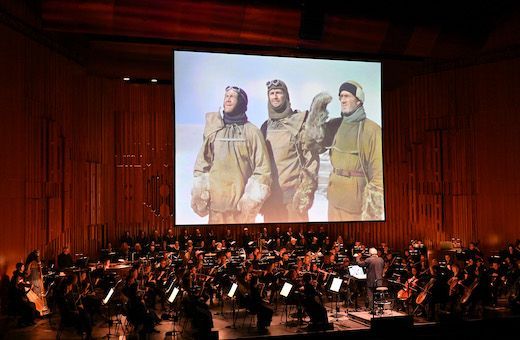Martyn Brabbins and the BBC Symphony Orchestra, as part of their celebrations of the Vaughan Williams 150th anniversary, performed a live orchestral version of the score to one of the iconic British films of the 1940s, Scott of the Antarctic. Rarely has a film score had such a rich and varied life beyond it being part of a creative whole. Vaughan Williams was so enthusiastic about the project that he composed a massive score even before the film was made. So, when the film was being edited, they had all the music they needed to hand. Inevitably much of the score was not used and the composer was loathe to let this material disappear without trace. The result was his later refashioning of the whole score into the Sinfonia Antartica. Nevertheless the music that remained is a substantial achievement and adds significantly to the films enduring appeal.

What interested Vaughan Williams was not the heroism of the ill-fated adventure, but Scott’s foolhardiness at trying to tame a nature so harsh and alien without proper preparation or respect for it and every bar of his score for this film is imbued with tragic foreboding. The theme of man’s insignificance in the face of huge forces had been present in many of his works from the Sea Symphony to his operatic masterpiece, Riders to the Sea. Vaughan Williams is often thought to be a fluffy composer of folk-inspired lighter works, but in fact, if you look at his output, the majority of his works are dominated by an obsession with death and the end of things. Sometimes this end can lead to an agnostic heaven, as in the Fifth Symphony, and at other times it leads to defeat and bleakness, as in his Sixth Symphony.
Charles Frend’s 1948 film Scott of the Antarctic remains an important and moving experience, even though it now appears to be dated, stiff and studio-bound in its first 30 minutes. Once it replaces cosy Englishness with snow and ice, it has a power and emotional pull that very few films have achieved before or since. Vaughan Williams' score enhances the atmosphere of the place and the endeavour with its distinctive, bleak harmonies and colourful orchestration, while never inappropriately taking centre stage. Its skill and potency were admired by many, including film music legend, Bernard Herrmann, who cited it as one of his main influences.
Martyn Brabbins and the BBCSO expertly navigated this premiere of the original score, finding the right dynamics and timings at every turn. All the sections seemed to be acutely aware of the film being shown above their heads and this led to the necessary integration.They were expertly joined by the women's voices of the BBC Symphony Chorus and the luxurious inclusion of the lustrous voice of Elizabeth Watts in the keening solo soprano role. An excellent job had been made removing the recorded music from the single soundtrack, while still retaining the wind effects and the audible integrity of the dialogue. The luxury of hearing the full glory of this orchestral score, but still very much within the creative framework of the film, was a truly memorable experience.


